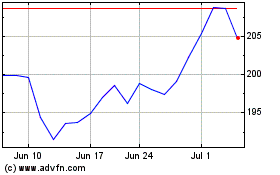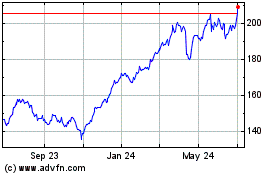Ally Says Auto Partnerships Strong Despite Chrysler Decision
April 26 2012 - 3:30PM
Dow Jones News
Ally Financial Inc. is determined to diversify its auto-lending
partners as it faces the potential loss of loan volume from
Chrysler Group LLC, Ally executives said Thursday.
They downplayed the potential effect of the auto maker's
decision to terminate a key financing contract next year, stressing
that Ally's overall relationship with Chrysler dealers should
remain intact.
"We fully planned for this," Jeff Brown, senior executive vice
president of finance and corporate planning for Ally, said during a
first-quarter-earnings conference call. "This was not a surprise to
us. Our financial plans for this year had assumed a decrease in
this level and we're not bothered by it."
Chrysler said Wednesday it told Ally it would not renew the
contract after it expires April 30, 2013. The auto maker was
required to give notice by the end of this month if it didn't plan
to continue the deal, which would have automatically renewed for
another year.
The move comes as Ally, which remains majority-owned by the U.S.
government, is battling against big banks, including J.P. Morgan
Chase & Co. (JPM), Wells Fargo & Co. (WFC) and U.S. Bancorp
(USB), that are bulking up in the auto-lending business as growth
prospects in other asset categories are muted. Ally's contract with
its other major customer, General Motors Co. (GM), also faces
challenges as GM adds additional lenders to the fray.
Ally executives stressed the Chrysler contract pertained to its
ability to offer "subvented" loans, or those that carry promotional
rates to lure customers, and not financing used to fund dealer
inventory, real estate and consumer loans offered under standard
rates. The lender has been working to diversify by striking
partnerships with other manufacturers and focusing more on used-car
lending, which rose 15% from a year earlier.
Subvented loans through GM accounted for 17.5% of Ally's total
U.S. originations, down from 21.7% in the fourth quarter. Chrysler
subvented loans were 5.2% of Ally's U.S. originations in the first
quarter, down from 5.4% in the fourth quarter.
Subvented loans are "by far the lowest-margin business that we
do," Michael Carpenter, chief executive of Ally, said during the
call.
"That loss of subvented share is much less important to us than
the loss of overall share," Carpenter said.
Chuck Eddy, who runs a Chrysler dealership in Youngstown, Ohio,
said he uses Ally for most of his financing needs, including
inventory and real estate financing and standard-rate consumer
loans. If Chrysler decides to entirely replace Ally or add other
lenders for subvented consumer loans, he doesn't expect it to
affect the rest of his relationship with Ally.
"If they can't touch the subvention, then they can't touch the
subvention," said Eddy, a member of Chrysler's National Dealer
Council. "Ally is still going to be my lender of choice" for the
rest of his financing needs.
Chrysler has been exploring other options for providing
financing to dealers and its customers, including setting up a
lending joint venture with several lenders, The Wall Street Journal
has reported. Ally could play a part in that.
"It is indicative of our willingness to open up a dialogue with
... different financial institutions," Chrysler Chief Executive
Sergio Marchionne said during an earnings conference call Thursday.
"We have an opportunity to establish a different model."
Toronto-Dominion Bank (TD, TD.T) bought Chrysler Financial, the
auto maker's former finance arm, from private-equity firm Cerberus
Capital Management LP last year.
GM, which still holds a minority stake in Ally, has also gotten
back in the captive-finance business. It acquired subprime lender
AmeriCredit Corp. in 2010 and has been bulking up its business.
GM has a contract with Ally for subvented loans that expires
Dec. 31, 2013. Most recently it struck a deal with Wells Fargo to
provide dealer and consumer financing, including subvented loans,
in GM's U.S. Western region.
Ally has made headway in diversifying, particularly in the
used-car lending market, said Mohak Rao, director of financial
institutions for Fitch Ratings. However, that also poses risk
because used loans tend to go to borrowers with lower credit.
The lender was rescued as part of the U.S. government's broader
bailout of the auto industry. Ally is about 74%-owned by the
government after receiving more than $17 billion through the
Troubled Asset Relief Program.
Plans for an initial public offering were halted last year as
mortgage-related losses weighed on the company. It is now trying to
sever itself from Residential Capital, its mortgage subsidiary that
Ally may put into bankruptcy proceedings in the coming weeks.
-By Andrew R. Johnson, Dow Jones Newswires; 212-416-3214;
andrew.r.johnson@dowjones.com
--Jeff Bennett contributed to this article.
JP Morgan Chase (NYSE:JPM)
Historical Stock Chart
From Mar 2024 to Apr 2024

JP Morgan Chase (NYSE:JPM)
Historical Stock Chart
From Apr 2023 to Apr 2024
